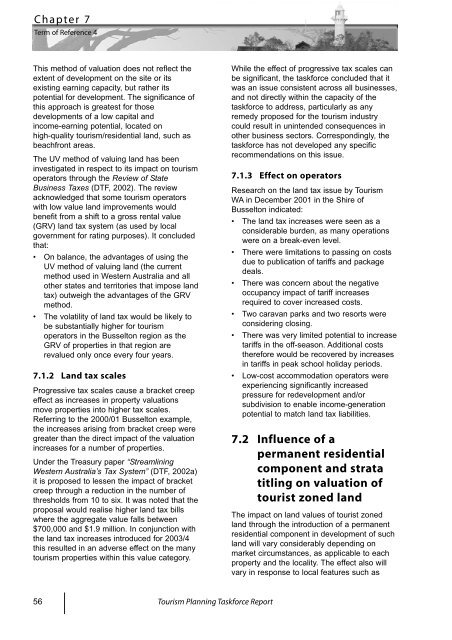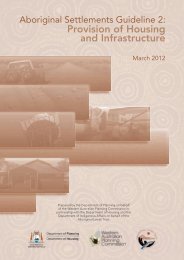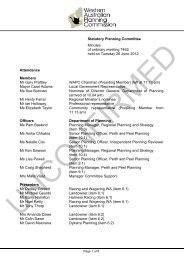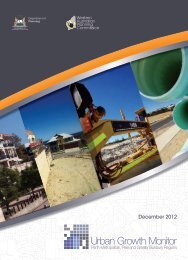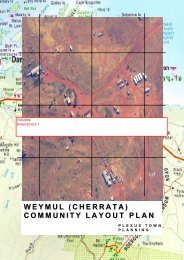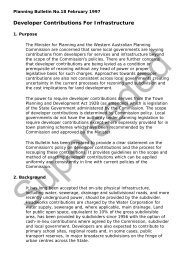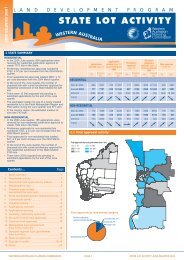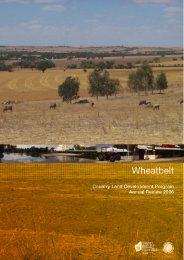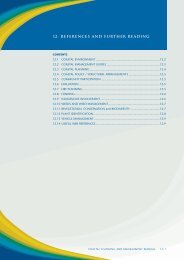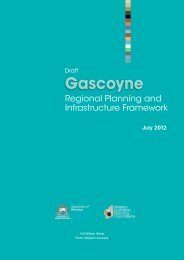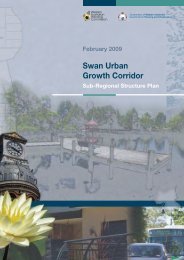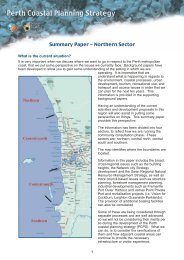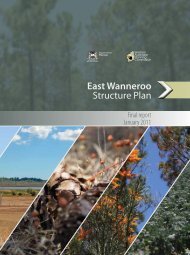Tourism Planning Taskforce Report - Western Australian Planning ...
Tourism Planning Taskforce Report - Western Australian Planning ...
Tourism Planning Taskforce Report - Western Australian Planning ...
- No tags were found...
Create successful ePaper yourself
Turn your PDF publications into a flip-book with our unique Google optimized e-Paper software.
Chapter 7Term of Reference 4This method of valuation does not reflect theextent of development on the site or itsexisting earning capacity, but rather itspotential for development. The significance ofthis approach is greatest for thosedevelopments of a low capital andincome-earning potential, located onhigh-quality tourism/residential land, such asbeachfront areas.The UV method of valuing land has beeninvestigated in respect to its impact on tourismoperators through the Review of StateBusiness Taxes (DTF, 2002). The reviewacknowledged that some tourism operatorswith low value land improvements wouldbenefit from a shift to a gross rental value(GRV) land tax system (as used by localgovernment for rating purposes). It concludedthat:• On balance, the advantages of using theUV method of valuing land (the currentmethod used in <strong>Western</strong> Australia and allother states and territories that impose landtax) outweigh the advantages of the GRVmethod.• The volatility of land tax would be likely tobe substantially higher for tourismoperators in the Busselton region as theGRV of properties in that region arerevalued only once every four years.7.1.2 Land tax scalesProgressive tax scales cause a bracket creepeffect as increases in property valuationsmove properties into higher tax scales.Referring to the 2000/01 Busselton example,the increases arising from bracket creep weregreater than the direct impact of the valuationincreases for a number of properties.Under the Treasury paper “Streamlining<strong>Western</strong> Australia’s Tax System” (DTF, 2002a)it is proposed to lessen the impact of bracketcreep through a reduction in the number ofthresholds from 10 to six. It was noted that theproposal would realise higher land tax billswhere the aggregate value falls between$700,000 and $1.9 million. In conjunction withthe land tax increases introduced for 2003/4this resulted in an adverse effect on the manytourism properties within this value category.While the effect of progressive tax scales canbe significant, the taskforce concluded that itwas an issue consistent across all businesses,and not directly within the capacity of thetaskforce to address, particularly as anyremedy proposed for the tourism industrycould result in unintended consequences inother business sectors. Correspondingly, thetaskforce has not developed any specificrecommendations on this issue.7.1.3 Effect on operatorsResearch on the land tax issue by <strong>Tourism</strong>WA in December 2001 in the Shire ofBusselton indicated:• The land tax increases were seen as aconsiderable burden, as many operationswere on a break-even level.• There were limitations to passing on costsdue to publication of tariffs and packagedeals.• There was concern about the negativeoccupancy impact of tariff increasesrequired to cover increased costs.• Two caravan parks and two resorts wereconsidering closing.• There was very limited potential to increasetariffs in the off-season. Additional coststherefore would be recovered by increasesin tariffs in peak school holiday periods.• Low-cost accommodation operators wereexperiencing significantly increasedpressure for redevelopment and/orsubdivision to enable income-generationpotential to match land tax liabilities.7.2 Influence of apermanent residentialcomponent and stratatitling on valuation oftourist zoned landThe impact on land values of tourist zonedland through the introduction of a permanentresidential component in development of suchland will vary considerably depending onmarket circumstances, as applicable to eachproperty and the locality. The effect also willvary in response to local features such as56 <strong>Tourism</strong> <strong>Planning</strong> <strong>Taskforce</strong> <strong>Report</strong>


